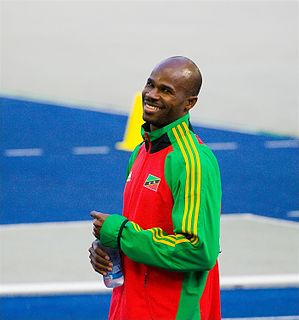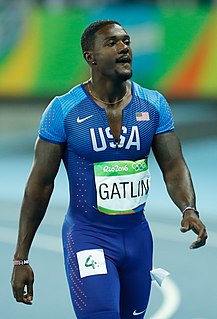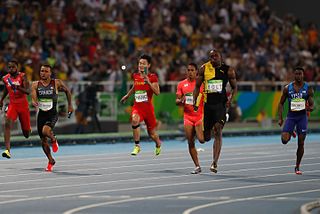
Linford Cicero Christie is a Jamaican-born British former sprinter. He is the only British man to have won gold medals in the 100 metres at all four major competitions open to British athletes: the Olympic Games, the World Championships, the European Championships and the Commonwealth Games. He was the first European to break the 10-second barrier in the 100 m and still holds the British record in the event. He is a former world indoor record holder over 200 metres, and a former European record holder in the 60 metres, 100 m and 4 × 100 metres relay.

Kim Collins is a former track and field sprinter from Saint Kitts and Nevis. In 2003, he became the World Champion in the 100 metres. He represented his country at the Summer Olympics on five occasions, from 1996 to 2016, and was the country's first athlete to reach an Olympic final. He competed at ten editions of the World Championships in Athletics, from 1995 to 2015, winning five medals. He was twice runner-up in the 60 metres at the IAAF World Indoor Championships. At regional level, he was a gold medallist at the Commonwealth Games and a silver medallist at the Pan American Games.

The 8th World Championships in Athletics, under the auspices of the International Association of Athletics Federations, were held at Commonwealth Stadium in Edmonton, Alberta, Canada between 3 August and 12 August and was the first time the event had visited North America. The music for the Opening and Closing Ceremonies was composed by Canadian composers Jan Randall as well as Cassius Khan and the events were televised live to an estimated viewing audience of 4 billion people in over 200 countries. The ceremonies also featured a 1000 voice choir, and the Edmonton Symphony Orchestra.

The 10th World Championships in Athletics, under the auspices of the International Association of Athletics Federations (IAAF), were held in the Olympic Stadium, Helsinki, Finland, the site of the first IAAF World Championships in 1983. One theme of the 2005 championships was paralympic events, some of which were included as exhibition events. Much of the event was played in extremely heavy rainfall.

Justin Gatlin is an American sprinter who specializes in the 100 and 200 metres events. He is a 5-time Olympic medalist and a 12-time World Championship medalist. He is the 2004 Olympic Champion in the 100 metres, the 2005 and 2017 100 metres World Champion, and the 2005 World champion in the 200 metres. Gatlin is a two-time 60 metres World Champion in 2003 and 2012, and the 2019 4 x 100 metres World Champion. He is considered to be one of the greatest sprinters of all time. Gatlin was banned from competing between 2006 and 2010 by USADA for failing a drugs test, testing positive for testosterone.

Bernard Rollen Williams III is an American male former track and field sprinter and winner of a gold medal in 4 × 100-meter relay at the 2000 Summer Olympics. He was the 200-meter dash silver medalist at the 2004 Summer Olympics and the 100-meter dash silver medalist at the 2001 World Championships in Athletics. He also won relay gold at the 2003 World Championships in Athletics and was the 100 m gold medalist at the 1999 Pan American Games.

The 100 metres, or 100-metre dash, is a sprint race in track and field competitions. The shortest common outdoor running distance, it is one of the most popular and prestigious events in the sport of athletics. It has been contested at the Summer Olympics since 1896 for men and since 1928 for women. The World Championships 100 metres has been contested since 1983.

The 4 × 100 metres relay or sprint relay is an athletics track event run in lanes over one lap of the track with four runners completing 100 metres each. The first runners must begin in the same stagger as for the individual 400 m race. A relay baton is carried by each runner. Prior to 2018, the baton had to be passed within a 20 m changeover box, preceded by a 10-metre acceleration zone. With a rule change effective November 1, 2017 that zone was modified to include the acceleration zone as part of the passing zone, making the entire zone 30 metres in length. The outgoing runner cannot touch the baton until it has entered the zone, the incoming runner cannot touch the baton after it has left the zone. The zone is usually marked in yellow, frequently using lines, triangles or chevrons. While the rule book specifies the exact positioning of the marks, the colors and style are only "recommended". While most legacy tracks will still have the older markings, the rule change still uses existing marks. Not all governing body jurisdictions have adopted the rule change.

Michael Frater O.D is a Jamaican sprinter who specialises in the 100 metres event. He won a silver medal at the 2005 World Championships and a gold medal at the 2003 Pan American Games for the event.

Troy Douglas is a former Dutch sprinter. Originally competing for Bermuda, he finished second at the 1995 IAAF World Indoor Championships in the 200 metres event, but he changed nationality to the Netherlands in 1998. For Bermuda he participated at the 1988, 1992 and 1996 Summer Olympics, reaching the semi finals on the 200 metres in 1996 as well as the semi finals on the 400 metres in 1992 and 1996. He finished 5th in the final of the 200 metres at the 1991 Pan American Games.
Davidson Ezinwa is a former sprinter from Nigeria.
Anson Henry is a retired Canadian sprinter of Jamaican descent who specialized in the 100 metres. He was born in Toronto, Ontario, Canada. His personal best time is 10.12 seconds, achieved in May 2006 in Doha. He also has 20.52 seconds in the 200 metres and 6.59 seconds in the 60 metres.

The United States competed at the 1956 Summer Olympics in Melbourne, Australia. 297 competitors, 251 men and 46 women, took part in 139 events in 18 sports.
Athletics at the 2008 Summer Olympics were held during the last ten days of the games, from August 15 to August 24, 2008, at the Beijing National Stadium. The Olympic sport of athletics is split into four distinct sets of events: track and field events, road running events, and racewalking events.
The athletics competition at the 2003 Pan American Games was held in Santo Domingo, Dominican Republic, from Tuesday, August 5, to Saturday, August 9, 2003. The competition comprised track and field events plus marathon races and three racewalking events, with a total of 46 contests taking place.

The 2015 IAAF World Championships, the fifteenth edition of the IAAF World Championships, were held from 22 to 30 August at the National Stadium in Beijing, China. Forty-three nations won medals, 144 of which were awarded. Kenya topped the medal table for the first time, with 7 gold, 6 silver and 3 bronze medals. The United States won 18 medals, six gold, six silver and six bronze, which was the highest tally. Host nation China, finished 11th on the medals table, while Russia finished ninth.
Mickey Grimes is a former American sprinter who specialized over 100 and 200 metres. He won the 100 metres at the 2003 Pan American Games, but was later stripped of his title for testing positive for ephedrine.

The 100 metres at the Summer Olympics has been contested since the first edition of the multi-sport event. The men's 100 m has been present on the Olympic athletics programme since 1896. The 100 metres is considered one of the blue ribbon events of the Olympics and is among the highest profile competitions at the games. It is the most prestigious 100 m race at elite level and is the shortest sprinting competition at the Olympics – a position it has held at every edition except for a brief period between 1900 and 1904, when a men's 60 metres was contested.

The 4×100 metres relay at the World Championships in Athletics has been contested by both men and women since the inaugural edition in 1983. It is the second most prestigious title in the discipline after the 4×100 metres relay at the Olympics. The competition format typically has one qualifying round leading to a final between eight teams. As of 2015, nations can qualify for the competition through a top eight finish at the previous IAAF World Relays event, with the remaining teams coming through the more traditional route of ranking highly on time in the seasonal lists.














